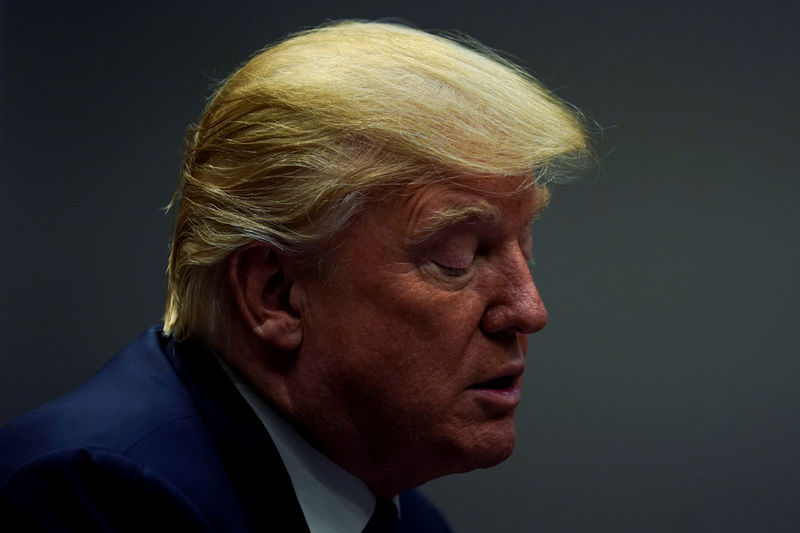By Susan Cornwell and Amanda Becker
WASHINGTON (Reuters) - A sweeping Republican tax bill would not boost the U.S. economy enough to offset a large deficit expansion that the measure would trigger, congressional analysts said on Thursday, as the Senate moved toward a decisive vote.
The new analysis complicated debate over the legislation, which won the backing earlier in the day of influential Republican Senator John McCain. Republican leaders were scrambling to make last-minute changes to win over remaining holdouts.
Stocks surged on hopes that Republicans were on the brink of the biggest tax code overhaul since the 1980s. The S&P 500 hit a record closing high and the Dow Jones industrial average topped the 24,000 mark for the first time.
Behind closed doors on Capitol Hill, concerns were mounting, however, about Republican Senator Bob Corker's push for a snap-back "trigger" amendment to the bill that would raise taxes automatically, possibly on corporations, if economic growth targets are not hit in the future, to offset a higher deficit.
Conservative Republican Senator Ted Cruz said at mid-afternoon that there were problems with the "trigger" proposal, and "a significant number of members would have a serious problem" if it only triggered tax hikes and not spending cuts."
The Joint Committee on Taxation, or JCT,, a nonpartisan fiscal analysis unit of Congress, said the bill, as passed by the Senate Finance Committee, would generate $407 billion in new tax revenue from increased economic growth.
JCT previously estimated the tax bill would balloon the $20 trillion national debt by $1.4 trillion over 10 years. The new estimate, counting "dynamic" economic effects, put the deficit expansion at $1 trillion, falling far short of assertions by some Republicans that the tax cuts would pay for themselves.
The new estimate gave Republican deficit hawks further cause for concern about how much the tax overhaul plan, which has evolved from the measure passed by the Finance Committee, would add to the budget deficit and the debt.
'FAIRY DUST'
House of Representatives Democratic leader Nancy Pelosi said the new JCT estimate showed "no amount of dynamic scoring fairy dust will fix the catastrophic deficits of the GOP tax scam."
Democrats, expected to unanimously oppose the tax bill, have dismissed it as a giveaway to the wealthy and corporations.
McCain, a key player in July's collapse of a Republican effort to gut Obamacare, backed the tax bill. While "far from perfect," the former presidential candidate said it would boost the economy and give tax relief to all Americans.
Republican Senator Susan Collins, who also played a role in the failure of the Obamacare rollback, told reporters she was still not committed to the bill.
Senator Jeff Flake, another Republican holdout, said: "We're still working on a few things."
The Republican-controlled Senate was expected to begin voting on amendments from Republicans and Democrats, but still had not done so by nightfall in Washington. A final vote on the bill was not expected until late in the evening or on Friday.
Several Republicans were withholding support while pushing for changes, including limits on how much the bill would expand the federal deficit, inclusion of a federal deduction for up to $10,000 in state and local property taxes, and bigger tax breaks for "pass-through" companies, including small businesses.
As drafted, the Senate bill would cut the U.S. corporate tax rate to 20 percent from 35 percent after a one-year delay and reduce the tax burden on businesses and individuals, while ending many tax breaks, but would still add at least $1 trillion to a federal debt load that already surpasses $20 trillion.
Some Republicans want to set the reduced corporate tax rate at 22 percent and forgo income tax cuts for the wealthiest Americans. Republican Senator Roy Blunt told reporters the 20 percent corporate rate "won't be raised much at all."
POLITICAL PRESSURE
President Donald Trump and his Republican allies want to enact tax cuts before January. If the Senate and House can craft a compromise bill that Trump will sign, it would give Republicans their first major legislative victory of 2017.
The House approved its own tax bill on Nov. 16.
Republicans fear that failure on the tax bill could alienate donors and jeopardize their control of the Senate and House of Representatives in the November 2018 congressional elections.
Among Americans aware of the Republican tax plan, 49 percent said they were opposed, up from 41 percent in October, according to a Nov. 23-27 Reuters/Ipsos poll released on Wednesday. The latest online poll of 1,257 adults found 29 percent supporting the plan and 22 percent saying they "don't know."

Republicans have a 52-48 majority in the 100-member Senate, giving them enough votes to win if they hold together. With Democrats opposed, Republicans can afford to lose no more than two of their own, with Vice President Mike Pence able to break a 50-50 tie.